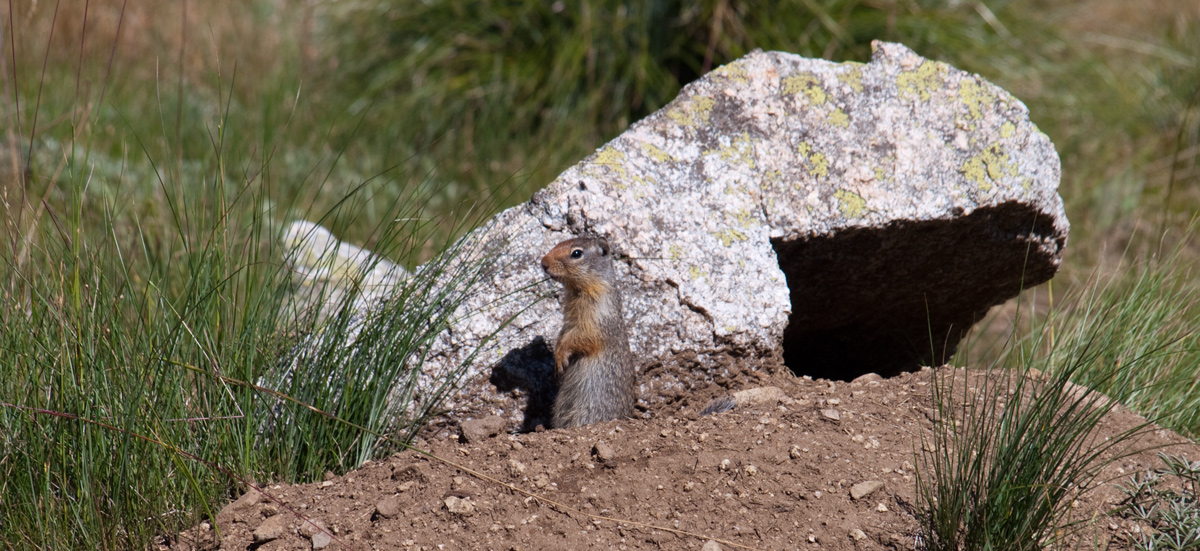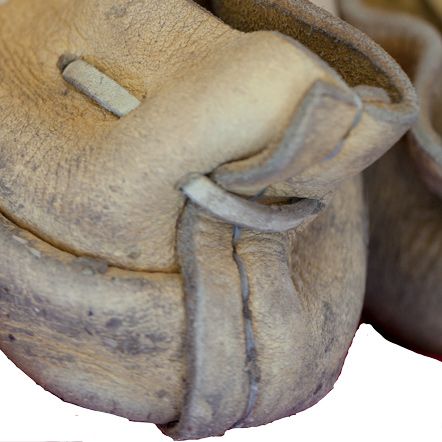Due to clouds at Camp Disappointment, Lewis cannot make celestial observations. The hunters have no luck and food is running low. Lewis is surprised so see Columbian ground squirrels east of the Continental Divide.
On the Yellowstone, Clark and his group finish two dugout canoes and begins making paddles and poles. They find signs that Crows are trying to steal their remaining horses, and Sgt. Pryor is given his orders to take them to the Knife River Villages.
Sgts. Gass and Ordway portage the canoes around the Great Falls of the Missouri. After multiple breakdowns, they get two across Box Elder Creek and camp. Pvt. Weiser suffers a bad cut on his leg.[1]For more on the captains’ strategy and various groups after leaving Travelers’ Rest, see Dividing Forces at Travelers’ Rest.
Lewis: Disappointing Day
Columbian Ground Squirrel, Lolo Trail
Spermophilus columbianus Ord (1815)[2]Spermophilus (sper-mo-phil-us) is Latin for “seed lover”; columbianus (co-lum-be-an-us) refers to the Columbia River basin. George Ord (1781-1866), whose most important work was done in … Continue reading
© 13 August 2020 by Kristopher K. Townsend. Permission to use granted under the Creative Commons Attribution-Share Alike 4.0 International license.
Behind this squirrel is a relatively small piece of Bitterroot Mountain granite.
Disappointing News
I dispatched Drewyer an Joseph fields this morning to hunt. I directed Drewyer who went up the river to observe it’s bearings . . . . both these hunters returned unsuccessful
—Meriwether Lewis
Indian Signs
Drewyer informed us that there was an indian camp of eleven leather lodges which appeared to have been abandoned about 10 days, the poles only of the lodges remained. we are confident that these are the Minnetares of fort de prarie [Atsinas] and suspect that they are probably at this time somewhere on the main branch of Maria’s river
—Meriwether Lewis
Cous Roots and Grease
we now rendered the grease from our tainted meat and made some mush of cows [cous] with a part of it, reserving as much meal of cows and grease as would afford us one more meal tomorrow.
—Meriwether Lewis
Columbian Ground Squirrel
near this place I observe a number of the whistleing [Columbian Ground] squirrel of the speceis common to the plains and country watered by the Columbia river, this is the first instance in which I have found this squirrel in the plains of the Missouri.
—Meriwether Lewis
Observations Obscured by Clouds
The clouds obscured the moon and put an end to further observation . . . . we indeavoured to take some fish but took only one small trout. Musquetoes uncommonly large and reather troublesome.
—Meriwether Lewis
Weather Diary (Lewis)
State of the weather at rise
Wind at rise
State of the weather at 4 P. M. Wind at 4 P. M. fair after thunder and lightning S E fair S W a distant thundercloud last evening to the west. mountains covered with snow.
—Meriwether Lewis
Plains Style Moccasin
© 2011 by Kristopher K. Townsend. Permission to use granted under the Creative Commons Attribution-Share Alike 4.0 International license.
Clark: Finishing the Canoes
Thieving Wolves
last night the wolves or dogs came into our Camp and eat most of our dryed meat which was on a scaffold
—William Clark
Fresh Indian Signs
Sgt. pryor found an Indian Mockerson and a Small piece of a roab, the mockerson worn out on the bottom & yet wet, and have every appearance of haveing been worn but a fiew hours before. those Indian Signs is Conclusive with me that they have taken the 24 horses which we lost on the night of the 20th instant, and that those who were about last night were in Serch of the ballance of our horses
—William Clark
Canoes Finished
the men finished both Canoes by 12 oClock to day, and I sent them to make Oars & get poles . . . . in the evening had the two Canoes put into the water and lashed together ores and everything fixed ready to Set out early in the morning
—William Clark
Pryor’s Instructions
I gave Sergt Pryor his instructions and a letter to Mr. Haney and directed that he G. Shannon & Windser take the remaining horses to the Mandans
—William Clark
Weather Diary (Clark)
State of the weather at Sun rise Wind at Sun rise State of the weather at 4 P. M Wind at 4 P M. fair N. E. cloudy S E violent wind last night from S W. The river has fallen within the last 24 hours 7 inches. the wind was violent from the S W for about 3 hours last night from the hours of 1 to 3 A. M.
—William Clark[3]To assist the reader of this web page, the date column is omitted and some abbreviations have been spelled out.
Gass and Ordway Portage Canoes
Reaching Box Elder Creek
we geered up the 4 horses and Set out with 2 Canoes one large & one Small one the truck wheels which bore the large canoe broke down often and troubled us much . . . . with much difficulty we got the 2 canoes & considerable of baggage to willow Creek about Sunset and Camped. Collins had killed three buffaloe.
—John Ordway
Weiser Cuts Leg
In our way to day, one of the men cut his leg very bad with a knife, which so lamed him that he had to ride in one of the canoes.
—Patrick Gass
Experience the Lewis and Clark Trail
The Lewis and Clark Trail Experience—our sister site at lewisandclark.travel—connects the world to people and places on the Lewis and Clark Trail.
Plan a trip related to July 23, 1806:
- Marias Museum of History and Art (Lewis)
- Billings, Montana (Clark)
- Three Forks to Billings Driving Tour (Clark)
- Lewis and Clark National Historic Trail Interpretive Center (Gass and Ordway)

Camp Disappointment is a High Potential Historic Site along the Lewis and Clark National Historic Trail managed by the U.S. National Park Service. The site is on private property within the Blackfeet Indian Reservation.
Clark’s Canoe Camp on the Yellowstone is a High Potential Historic Site along the Lewis and Clark National Historic Trail managed by the U.S. National Park Service. The site is on private property.
The Great Falls Portage is a High Potential Historic Site along the Lewis and Clark National Historic Trail managed by the U.S. National Park Service. It includes Sulphur Springs (open to the public) and Lower Portage Camp site (private land), and the Upper Portage Camp Overlook.
Notes
| ↑1 | For more on the captains’ strategy and various groups after leaving Travelers’ Rest, see Dividing Forces at Travelers’ Rest. |
|---|---|
| ↑2 | Spermophilus (sper-mo-phil-us) is Latin for “seed lover”; columbianus (co-lum-be-an-us) refers to the Columbia River basin. George Ord (1781-1866), whose most important work was done in the field of ornithology, was among the more prominent naturalists of his generation. He was responsible for writing the first scientific taxonomies of several mammalian specimens observed by Lewis and Clark, including the grizzly bear, pronghorn, and Columbian ground squirrel. |
| ↑3 | To assist the reader of this web page, the date column is omitted and some abbreviations have been spelled out. |




